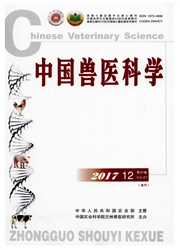

 中文摘要:
中文摘要:
为研究弓形虫热应激蛋白40(TgHSP40)的生物学特性,采用RT-PCR方法从弓形虫RH株中扩增出TgHSP40基因片段,并将其克隆到原核表达载体pET一30a(+)后转化入表达菌BL21(DE3)进行IPTG诱导表达,应用Western—blot对重组蛋白的反应原性进行分析。结果显示,重组菌可表达出分子质量约46ku的重组融合蛋白,在37℃、IPTG浓度为1.0mmol/L、诱导6h的情况下表达效果最好。重组蛋白经纯化后进行的Western—blot分析证实,表达、纯化的弓形虫RH株HSP40蛋白具有良好的反应原性,与弓形虫基因I型的RH株、基因Ⅱ型的PRU株以及基因型为ToxoDB9的TgC7株和GJS株的阳性血清均可发生特异性反应,预期可作为弓形虫病ELISA诊断方法的候选抗原。本研究结果为弓形虫病新型诊断方法的建立奠定了基础。
 英文摘要:
英文摘要:
In order to analyze the biological characteristics of the heat shock protein 40(TgHSP40) in different genotypes of Toxoplasma gondii, the target gene was amplified by RT-PCR using a pair of speci- fic primers. Then the fragments were linked into the prokaryotic expression vector pET-30a(+) and trans- formed into Escherichia coli BL21 (DE3) strain. The recombinant protein TgHSP40 was expressed by indu- cing with IPTG and analyzed its reactinogenicity by Western-blot. In result,the recombinant protein with a molecular weight of 46 ku was expressed in E. coli by the optimized condition:inducing with 1.0 mmol/L IPTG and shaking for 6 h at 37 ~C. Western-blot analysis indicated that the TgHSP40 protein reacted with sera from mice challenged with RH, PRU and TgC7 strains and sera from pigs that challenged with GJS strain,respectively,and possessed good reactinogenicity, indicating that it could be a potential candidate antigen for developing new detection methods for toxoplasmosis.
 同期刊论文项目
同期刊论文项目
 同项目期刊论文
同项目期刊论文
 Evaluation of Immune Responses in Mice after DNA Immunization with Putative Toxoplasma gondii Calciu
Evaluation of Immune Responses in Mice after DNA Immunization with Putative Toxoplasma gondii Calciu Evaluation of immuno-efficacy of a novel DNA vaccine encoding Toxoplasma gondii rhoptry protein 38 (
Evaluation of immuno-efficacy of a novel DNA vaccine encoding Toxoplasma gondii rhoptry protein 38 ( Toxoplasma gondii rhoptry protein 38 gene: sequence variation among isolates from different hosts an
Toxoplasma gondii rhoptry protein 38 gene: sequence variation among isolates from different hosts an Changes in the proteomic profiles of mouse brain after infection with cyst-forming Toxoplasma gondii
Changes in the proteomic profiles of mouse brain after infection with cyst-forming Toxoplasma gondii Protective immunity induced by a DNA vaccine expressing eIF4A of Toxoplasma gondii against acute tox
Protective immunity induced by a DNA vaccine expressing eIF4A of Toxoplasma gondii against acute tox Sequence variation in the Toxoplasma gondii ROP20 gene among strains from different hosts and geogra
Sequence variation in the Toxoplasma gondii ROP20 gene among strains from different hosts and geogra Comparative proteomic analysis of different Toxoplasma gondii genotypes by two-dimensional fluoresce
Comparative proteomic analysis of different Toxoplasma gondii genotypes by two-dimensional fluoresce Sequence Variation in HSP40 Gene among 16 Toxoplasma gondii Isolates from Different Hosts and Geogra
Sequence Variation in HSP40 Gene among 16 Toxoplasma gondii Isolates from Different Hosts and Geogra Protective efficacy of two novel DNA vaccines expressing Toxoplasma gondii rhomboid 4 and rhomboid 5
Protective efficacy of two novel DNA vaccines expressing Toxoplasma gondii rhomboid 4 and rhomboid 5 A long-lasting protective immunity against chronic toxoplasmosis in mice induced by recombinant rhop
A long-lasting protective immunity against chronic toxoplasmosis in mice induced by recombinant rhop 期刊信息
期刊信息
